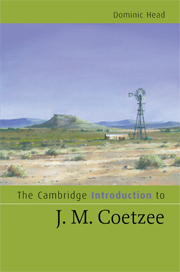Chapter 2 - Coetzee's contexts
Published online by Cambridge University Press: 05 June 2012
Summary
Coetzee's novels occupy a special place in South African literature, and this is a context that is inevitably brought to bear on much of his writing; yet his work has an influential bearing on the development of the novel more widely, into the twenty-first century, and this broader context of the ‘internationalization’ of the novel is increasingly relevant to the appreciation of his achievements. This chapter, then, considers both the historical context in which Coetzee's career unfolds, and the intellectual and ideological context that is part and parcel of his life and times.
For much of his career, Coetzee lived and worked in South Africa, under the apartheid regime until 1990, and then witnessing the political difficulties of the transition to democratic government. Until he emigrated to Australia in 2002, it was the South African context that permeated his writing. His work has embodied a form of intellectual challenge both to the late-colonial violence and oppression of apartheid, and to the dangers of retributive violence in the period of transition to democratic rule. In either case, his work has not always chimed with the popular mood: as an ‘apartheid novelist’, a term he would strongly resist, his work has been perceived as too oblique, with an insufficient political charge. Subsequently – and Disgrace is the most obvious example – he has been found to be out of kilter with the celebratory drive of new nation-building in post-apartheid South Africa.
- Type
- Chapter
- Information
- The Cambridge Introduction to J. M. Coetzee , pp. 22 - 36Publisher: Cambridge University PressPrint publication year: 2009



